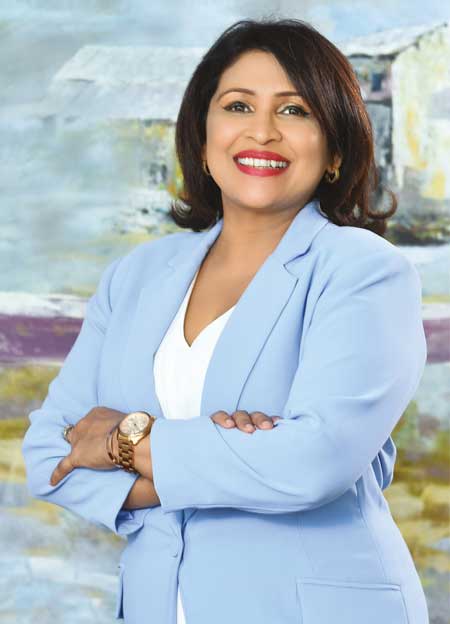ESSENCE PROFILE
DIMO

Executive Director
Chief Human Resources Officer
Q: What do gender, diversity and inclusion mean at DIMO?
A: ‘Diversity, Inclusion and Equity’ is a strategic priority under our sustainability efforts. We channel all our efforts into eradicating unconscious bias among staff and create a respectful workplace.
We work towards creating a harassment free and equitable workplace to increase significantly the number of women in decision-making positions. Empowering our women employees and creating a respectful workplace will increase the engagement of ‘the DIMO tribe’; and also, attract the best talent and customers.
Q: How are women leaders navigating the current economic crisis?
A: Women leaders are resilient and persistent. These are important qualities, among other competencies and virtues possessed by women leaders, which help them to navigate crisis situations.
Around the world, women leaders are rated high in communication, integrity and problem-solving skills – for example, former New Zealand prime minister Jacinda Ardern, a leader who managed many situations that prevented an economic crisis.
Others include Taiwan’s President Tsai Ing-wen, who took the initiative to stop all flights from China to control the spread of COVID-19 in the region; and former German chancellor Angela Merkel, who successfully navigated a financial crisis in 2008 and migrant influx in 2015.
Q: What is your view of the current brain drain in Sri Lanka – and what can be done to stem the flow?
A: Today, professionals and skilled workers largely seek opportunities overseas, creating a vacuum in healthcare, engineering, business and other skills sectors. The impact of the brain drain will be felt more in the coming years as it will leave the country with an ageing population, as well as crippled organisations and businesses.
Those leaving the island dispose of their assets and take the money out of the country, which also impacts the economy directly. It’s unfortunate that steps are not being taken to prevent or reduce this brain drain as it is causing a major loss for the country.
To reverse the tide, authorities will have to take some drastic measures to treat the critical talent that we lose in a different manner – for instance, by creating opportunities and providing a better quality of life.
As free education is offered, it’s imperative to implement measures to ensure that people serve the country – at least, for a particular period of time – prior to migrating.
Q: Can the gap created by the brain drain be plugged by ushering more women into the workplace?
A: Yes, this can bridge the gap created by the brain drain. We need to increase women’s participation in the economy by creating more opportunities for them to enter the workforce. Ignoring 50 percent of the population means that we don’t realise the full potential of our country.
Women are prevented from entering the workforce due to a lack of education and skills. Another significant factor that prevents women from both entering the labour force, and continuing to work in it, is the challenge of balancing home and work commitments.
Unconscious bias and gender stereotyping leading to gender inequality is a global challenge; but it’s time that we as a nation – and as an industry – take some aggressive steps to build up infrastructure to get more women to join the labour force and bring back female talent that dropped out due to family commitments.
Though we may try to bridge the gap by increasing women’s participation in the labour force however, there is nothing to prevent women from looking for greener pastures if the conditions are not favourable in the workplace or our country.
Q: What is your vision for businesswomen in the country?
A: I simply believe that the percentage of businesswomen we see in Sri Lanka is insignificant. Therefore, it’s important that we implement inclusiveness and gender equality across all sectors and industries so that the social roles of women would not hinder their career development.
Further, there should be opportunities and mechanisms in place for women to enjoy a better work-life balance. In the future, I envision a world where women no longer have to choose between achieving their career goals, and conforming to social biases and norms
“In the future, I envision a world where women no longer have to choose between achieving their career goals, and conforming to social biases and norms.
Telephone 2449797
Email dimo@dimolanka.com
Website www.dimolanka.com




